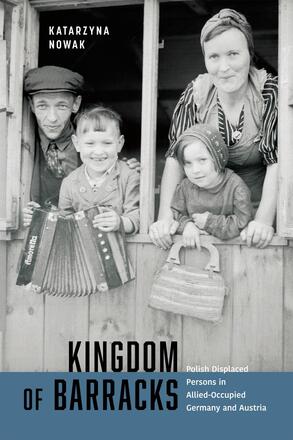
Kingdom of Barracks
Polish Displaced Persons in Allied-Occupied Germany and Austria
Bringing to life experiences of forgotten refugees of the postwar era.
Description
After World War II displaced more than sixty million people, Cold War politics opened global eyes and wallets to European displaced persons. The postwar experiences of more than three million forcibly displaced Polish people illuminate the painfully long process of reckoning with war and its fallout.
Drawing on rich primary material unearthed in over a dozen archives, Kingdom of Barracks depicts the texture of everyday life in refugee camps in post–World War II Europe within a panorama of the social and cultural history of the twentieth century. Western Allies and Polish social elites construed the camps as spaces for rehabilitating and “re-civilizing” refugees to prepare them for the reconstruction of war-torn countries and a rebirth of the nation. On the ground, refugees lived in close proximity, sharing bug-infested barracks with people from other regions, social classes, and wartime experiences. Taking a bottom-up perspective and exploring the formation of cultural identity in exile through the lenses of class, gender, body, and nationality, Katarzyna Nowak argues that Polish DPs’ experiences of displacement stimulated a personal and a collective revival understood in religious and national terms.
In an age of intensifying forced displacement, Kingdom of Barracks sheds new light on past experiences of war and migration that are still deeply relevant in the present.
Reviews
“Throughout the fresh retelling of life in the barracks and the complex efforts of the DPs to find their way in the postwar order, Katarzyna Nowak gives agency and individuality back to the refugees. Everyday life here is neither idealized as consistently committed to a national agenda nor generalized as a mere set of responses to the rigid rules of camp officials. Rather, Nowak brings out the petty crime, the love affairs, the desperate efforts to keep families together, and the myriad ways DPs sought to game the system of impersonal bureaucracy. She breathes new life into the stories of a whole generation of survivors, who were compelled to live in extended postwar deprivation for many years past the end of formal hostilities in Europe. As a result, Kingdom of Barracks makes a tremendous contribution to our understanding of Cold War refugeedom, the evolution of the Polish diaspora, and changes to the cultural makeup of Polishness abroad.” Keely Stauter-Halsted, University of Illinois Chicago and author of The Nation in the Village: The Genesis of Peasant National Identity in Austrian Poland, 1848–1914
“Nowak’s well-written and well-re‐ searched cultural and social history of Polish dis‐ placed persons in the aftermath of the Second World War... is an exemplary addition to the canon of postwar historical literature. Her ability to weave individual destinies in and out of international political processes allows the author to keep displaced per‐ sons’ interests at the forefront of their own history while continuously giving them a voice in defining their own lives – and histories. Nowak’s Kingdom of Barracks is, therefore, a formidable addition to a growing body of literature that focuses on some of the traditionally forgotten victims of Nazism, a deficit of literature that historical academia has only begun to address in recent years." H-Poland